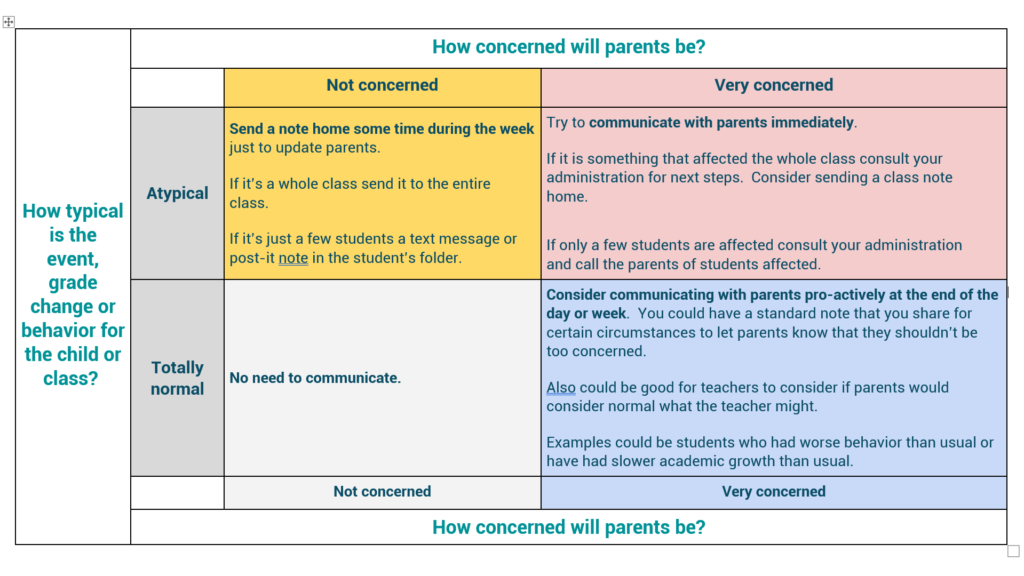How To Improve Teacher Parent Communication
Teacher parent communication. Parents sometimes say “I want better communication with my child’s teacher.” What does that mean? And is it really possible? The short answer is – yes! There are easier ways to improve teacher to parent communication. This is part 1 of our 2 part series on this topic.
Finding the Perfect Teacher Parent Communication Match is Hard
It’s not easy to find a “one size fits all” solution to teacher parent communication.
Teachers are diverse people – as are parents. So what may be the perfect amount of communication for one parent might be too much communication for another parent. Similarly, what one teacher may feel is reasonable for communication may not meet a parent’s need for what is reasonable.
Additionally, the method of preferred communication may vary. While one parent may want only emails, texts, or letters in a folder, other parents may want a phone call. We want parents to appreciate that meeting the diversity of parent communication needs or desires can be tricky.
 It is Possible to Meet Parents’ Diverse Needs for Communication?
It is Possible to Meet Parents’ Diverse Needs for Communication?
While it isn’t easy, it is possible to meet most parents’ needs for teacher parent communication. Typically when parents are frustrated with a lack of communication it is because things are going “off script” and parents feel in the dark.
“Off script” includes a child who is struggling behaviorally or academically. Or sometimes, school just doesn’t go as planned.
When a parent is seeing that something isn’t working, they want to be in constant teacher parent communication.
How Can School Administrators Support Teachers?
First, help teachers identify parent preferences for teacher parent communication and segment them.
-
- Communication Frequency (Daily, Weekly, Monthly, Quarterly, Annually)
- Communication Methods (Flyers or Papers, Emails, Texts, Phone)
- Urgency of Communication (High, student is struggling; Medium, student is solid but not passionate or excited; Low, student is doing well)
Support teachers in identifying their own preferences for teacher parent communication!
-
- Teachers’ Preferred Communication Frequency
- Teachers’ Preferred Communication Methods
- Students Teacher is Feeling Most Urgent About
Help teachers match and articulate their preferences with their parents.
Teachers can proactively send a letter and text letting parents know how often they’ll communicate. They can also let parents know that if they want more communication that email is the best way to reach them.
Help teachers identify all the methods of communication they can use!
-
- Text! (if they don’t want to use their number, they can use a google voice number).
- Weekly email (they can give parents the option to “opt into” the email if they want
- Written note on an assignment or daily sheet
Take communication off of your teacher’s plates where you can!
There are places where your teachers are uniquely positioned to communicate – but there are also places where you as the school can potentially fill that role. Of course at Possip we think the routine Pulse Checks™ can help schools do just that. But what else can schools communicate?
– how often should parents expect to hear from their child’s teacher?
– through what methods should parents expect to hear from the school or their child’s teacher?
– what is the curriculum kids will be taught?
– what is your vision for the school?
– are there upcoming events parents should look forward to?
– what are behavioral expectations?
Give teachers a rubric or method for determining when they should communicate.
Below is an example rubric you can use. This can help teachers know when teacher parent communication is best advised – in reactive scenarios.
This is part 1 of our post on teacher parent communications.
Be on the look out for a future part 2!
Want to learn more? Consider checking out our other blogs:
7 Tips to Help Parents Belong or Getting Your School A Plan to Respond to Bullying





